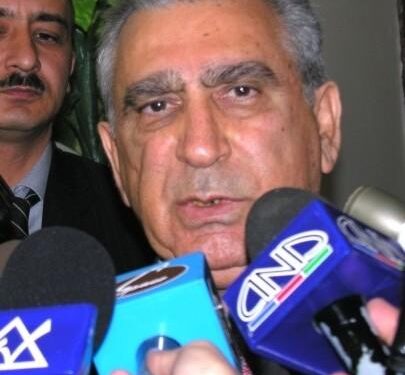The recent arrest of Mehdiyev has cast a spotlight on the persistent undercurrents of tension between Azerbaijan and Russia, underscoring unresolved issues in their complex bilateral relationship. As reported by Eurasianet, this development not only signals a potential shift in the geopolitical dynamics of the South Caucasus but also raises questions about Moscow’s influence and Azerbaijan’s strategic calculations in the region. This analysis explores the broader implications of Mehdiyev’s detention and what it reveals about the evolving nature of Azerbaijani-Russian ties.
Analysis of Mehdiyev Arrest Reveals Deep-Rooted Azerbaijani-Russian Diplomatic Strains
The arrest of Mehdiyev has shed light on the increasingly complex and strained relations between Azerbaijan and Russia, marking a significant moment in their diplomatic interactions. Analysts note that this incident is symptomatic of broader geopolitical currents, including diverging interests in the South Caucasus region, energy politics, and security concerns. While both states maintain formal diplomatic channels, underlying mistrust and unresolved tensions continue to hamper cooperation on critical issues such as border security, trade agreements, and regional influence.
Key factors contributing to the diplomatic strain include:
- Competing Geopolitical Ambitions: Russia’s efforts to maintain influence over the South Caucasus clash with Azerbaijan’s pursuit of stronger ties with Western powers.
- Security and Intelligence Frictions: Suspicion over espionage activities and intelligence sharing has amplified distrust on both sides.
- Economic and Energy Rivalries: Despite cooperation, competition over energy routes and market access fuels contention.
| Dimension | Azerbaijan’s Position | Russia’s Position |
|---|---|---|
| Diplomatic Stance | Seeking diversified alliances | Preserving regional dominance |
| Security Focus | Strengthening national sovereignty | Controlling destabilization risks |
| Economic Interests | Expanding energy export routes beyond Russia | Maintaining energy market leverage |
| Regional Influence | Increasing engagement with Western partners | Asserting dominance in the South Caucasus |
In summary, the Mehdiyev arrest symbolizes deeper divergences in the bilateral relationship, highlighting the delicate balancing act both Azerbaijan and Russia face as they navigate overlapping interests and rivalries. The incident serves as a cautionary example of how unresolved diplomatic and strategic disputes can escalate, underscoring the need for dialogue and confidence-building measures to stabilize this pivotal regional relationship.
Implications for Regional Security and Bilateral Relations in the South Caucasus
The recent arrest of Mehdiyev underscores the fragility of the South Caucasus security environment, where historical grievances and strategic interests continue to fuel distrust between Azerbaijan and Russia. This incident not only strains bilateral ties but also threatens to complicate ongoing regional initiatives aimed at stabilizing conflict zones and fostering economic cooperation. Observers note that such developments risk undermining the delicate balance maintained through diplomatic channels, potentially prompting recalibrations in military posturing and alliances across the region.
As tensions simmer, the broader implications for regional security become evident in several key areas:
- Energy Transit Routes: With Azerbaijan serving as a critical corridor for oil and gas pipelines to Europe, any diplomatic rift could jeopardize energy security and investment plans.
- Multilateral Engagements: Existing frameworks involving Russia, Turkey, and Iran may face setbacks due to growing mistrust, complicating conflict resolution mechanisms.
- Military Cooperation: Azerbaijan’s defense partnerships and Russia’s regional presence may be recalibrated, affecting peacekeeping roles and security guarantees.
| Aspect | Potential Impact | Short-Term Outlook |
|---|---|---|
| Diplomatic Relations | Increased diplomatic caution and mutual suspicion | Heightened dialogue yet with limited breakthroughs |
| Security Cooperation | Reduced joint initiatives and intelligence sharing | Possible suspension of coordinated patrols |
| Economic Projects | Delays in infrastructure and trade agreements | Temporary freeze on new investments |
Strategic Recommendations for De-escalating Tensions and Enhancing Cooperation
To effectively address the ongoing strains highlighted by Mehdiyev’s arrest, policymakers must prioritize transparent diplomatic channels that reinstate mutual trust between Azerbaijan and Russia. Establishing regular bilateral forums focused on security, trade, and cultural exchange could serve as vital platforms for reducing misunderstandings and fostering stability. Moreover, encouraging third-party mediation through institutions such as the Eurasian Economic Union or the OSCE can provide neutral ground for constructive dialogue and conflict resolution.
- Enhance military communication: Implement confidence-building measures to prevent accidental escalations.
- Revitalize economic partnerships: Promote joint infrastructure projects to deepen interdependency.
- Strengthen people-to-people contacts: Facilitate educational and cultural programs to rebuild grassroots relations.
- Institutionalize crisis response mechanisms: Develop coordinated strategies to quickly manage incidents escalating tensions.
| Area of Cooperation | Recommended Actions | Expected Impact |
|---|---|---|
| Security | Joint monitoring patrols along sensitive borders | Reduced risk of unintended clashes |
| Economy | Expand trade corridors and tariff reductions | Boost in bilateral commerce and job creation |
| Culture | Exchange of artists, students, and professionals | Improved public perception and mutual understanding |
Long-term cooperation will depend on a shared commitment to constructive engagement that transcends momentary political setbacks. Both sides must embrace pragmatism over rhetoric, viewing their relationship through the lens of mutual benefits rather than zero-sum rivalry. Only by crafting pragmatic frameworks that address core concerns and mutual interests can Azerbaijan and Russia build a resilient partnership capable of weathering future challenges.
To Wrap It Up
The arrest of Mehdiyev underscores the persistent undercurrents of tension between Azerbaijan and Russia, highlighting the complexities that continue to shape their bilateral relationship. As both nations navigate a shifting regional landscape, this incident serves as a stark reminder of the unresolved issues that could impact future cooperation and stability in the South Caucasus. Observers will be closely monitoring developments, as the repercussions of Mehdiyev’s detention may extend beyond immediate diplomatic strains, influencing broader geopolitical dynamics in Eurasia.















